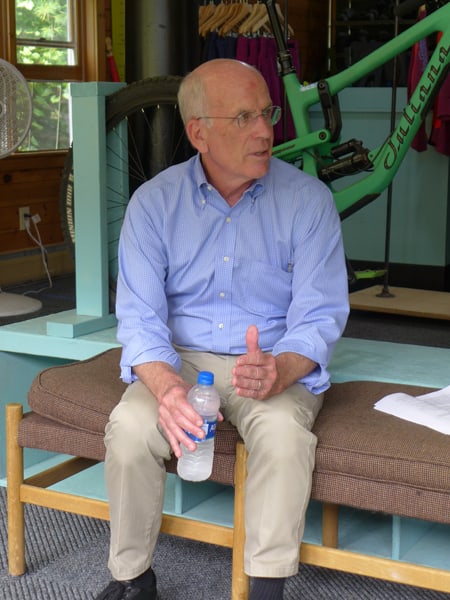By Curt Peterson

Rep. Peter Welch takes a break from a roundtable talk.
POMFRET—Congressman Peter Welch, who is running for re-election this November, met with recreational cyclists in the ski shop at Woodstock Inn’s Suicide Six Ski Resort in South Pomfret to discuss outdoor recreation, a significant part of Vermont’s economy.
Outdoor recreation is a large and growing producer of local business revenue.
A 2010 survey indicated horse events alone brought $4.2 million into the Vermont economy, according to Tracey Ostler, the executive director of the Green Mountain Horse Association in South Woodstock.
“We stable the horses,” Ostler said, “but the humans with them have to stay in local hotels, rent accommodations and eat in local restaurants.”
Woodstock attorney Peter Vollers and Suicide Six manager Tim Reiter both said anecdotally they feel more Americans want to get outdoors, which is a main reason they choose Vermont as their destination.
“My office faces Route 4 in Woodstock,” Vollers said. “Every day in the summer I see more and more out-of-state cars drive by with $4,000 bikes on their roofs.”
Reiter agreed – saying there is more traffic in the summer than in ski season, and outdoor facilities and activities are necessary to capitalize on increased tourism.
Welch applauded volunteers who developed bike trails at Mount Ascutney, in the Rochester area, and the commercial investments in trails such as those at Suicide Six. He asked what can be done to support the efforts.
Seth Westbrook, president of the Woodstock Area Mountain Biking Association (WAMBA), said complications caused by Vermont Act 250 environmental regulations are a significant barrier to building trail systems.
The law treats environmentally-friendly 4-foot wide bike trails as if they were hotel developments, Westbrook said, creating unnecessary paperwork and requiring multiple inspections.
Another issue is unused existing permits, he explained. WAMBA had to jump through legal hoops to work around a long-abandoned Act 250 permit in order to get permission to build their trails.
“When I was at the State House,” Welch said, “whenever someone brought up Act 250, people went into a defensive crouch. There must be some way for the law to draw a distinction between the type of development at Jay Peak, and bicycle trails.”
Charlie Kimball, a state representative from Woodstock and avid biker, said changes in Act 250 that might facilitate trail development have been put on the back burner, pending recommendations by a 50-year plan study commission.
“I’m an Act 250 believer,” Welch said. “I think it’s important for the environment. But it’s only a good law if it works, and you’re telling me it isn’t working for bike trails.”
Welch said if the Democrats win a majority in Congress in November, the stalled infrastructure bill will be a top priority. He thinks recreational trails should be considered part of infrastructure just like highways and bridges.
“And I would like to see us make funds available to the outdoor recreation industry, and not just to finance studies,” Welch said.
The Mountain Times asked how much impact Canadian tourists have on the Vermont outdoor recreation business, and how the current trade rift between Canada and the U.S. and tougher border restrictions might affect the local economy.
Vollers said one-third to aone-half of entrants in his Vermont Overland bike events come from Canada. All the round-table participants said Canadians make up as much as half their customer base.
“We can’t lose Canadian tourism,” Welch said.
No one had heard of Canadian visitors encountering trouble at the border, but Reiter said the tightening of restrictions on work visas by the Trump Administration have hurt seasonal businesses significantly.“Immigration of much-needed employees from Canada has become more difficult,” Reiter said. “We seem to be setting up roadblocks for ourselves by keeping them out.”



